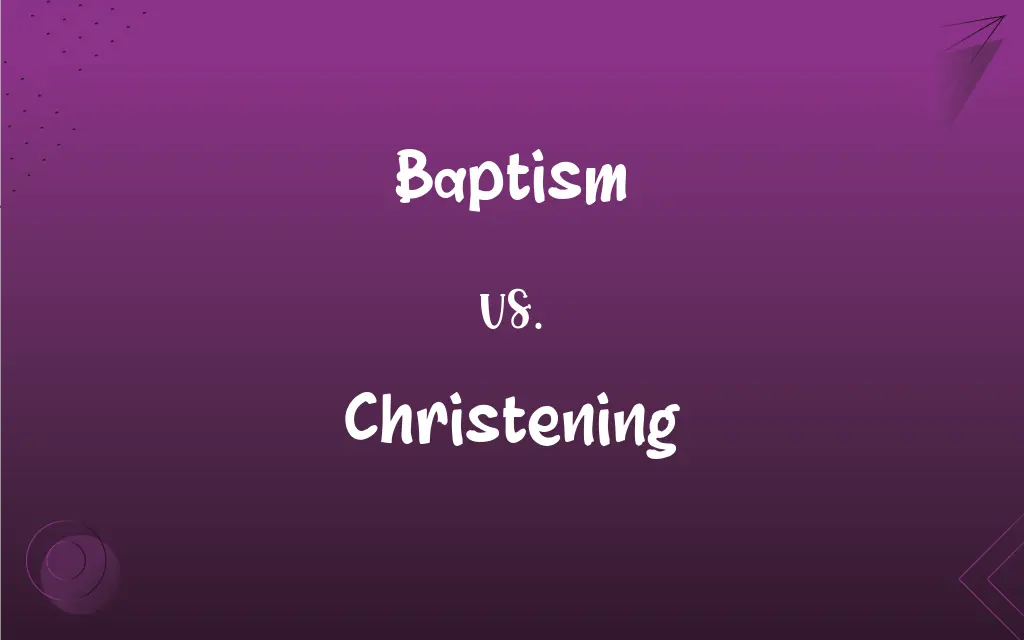Baptism vs. Christening: What's the Difference?
Edited by Janet White || By Harlon Moss || Updated on October 9, 2023
Baptism is a Christian sacrament of admission and adoption, while christening is the act of naming a child and sometimes, but not always, baptism.

Key Differences
Baptism represents a deliberate act of identification with the person of Jesus Christ and his teachings. It's a public confession of faith and a renunciation of sin, often involving immersion in water. In several Christian traditions, it holds significant importance as it marks a moment where an individual is spiritually reborn and cleansed of original sin.
Contrastingly, christening is traditionally associated with naming a child. It's often a ceremony in which a baby or a ship is given a name and, in the case of a child, traditionally it often includes baptism, but it doesn’t have to. In many Christian traditions, particularly in Anglican and some Protestant denominations, the terms baptism and christening are used interchangeably, although technically they do have different primary implications.
In baptism, an individual is submerged or sprinkled with water in a symbolic gesture of purification and admission into the Christian faith. This act is profound and meaningful, emphasizing a person's choice (or the parental choice in some denominations) to follow Christian teachings and acknowledge the salvific acts of Jesus.
Conversely, christening refers primarily to the naming ceremony, often used to indicate the giving of a Christian name to a child. While many people associate it with the baptism of infants, it’s crucial to note that christening can occur without baptism, especially in a secular context where it’s more about naming than any religious admission or purification.
Baptism is predominantly an event that pertains to an individual's spiritual life and their relationship with the divine. It symbolizes redemption, the washing away of sin, and the individual’s acceptance into the church community. It's a practice rooted deeply in theological beliefs and can be administered to individuals of various ages, depending on the denominational beliefs.
ADVERTISEMENT
In contrast, christening, when related to infants, is often viewed as a social event as well as a religious one. Families gather, names are conferred, and there is generally a celebration involved. While it possesses a spiritual aspect, especially when coupled with baptism, it leans heavily towards being a familial and social celebration, involving godparents, family, and friends in welcoming and naming the child.
Comparison Chart
Primary Purpose
Admission and adoption into the Christian faith.
Naming a child, often alongside a baptism.
Symbolic Act
Immersion, submersion, or sprinkling of water.
Naming and sometimes sprinkling of water.
Age Consideration
Can be performed at any age.
Often performed on infants.
Spiritual Emphasis
Strong, focuses on rebirth and purification.
May be more social and familial.
ADVERTISEMENT
Universal
Generally accepted across Christian denominations.
Views and practices may vary significantly.
Baptism and Christening Definitions
Baptism
Baptism as a Community Welcome.
The community joyfully welcomed the new believers through baptism.
Christening
Christening as a Celebration.
Family and friends gathered to joyfully commemorate the christening.
Baptism
Baptism as a Public Profession of Faith.
Through baptism, Lisa made a public profession of her Christian faith.
Christening
Christening as a Formal Introduction.
Through the christening, the infant was formally introduced to the community.
Baptism
Baptism as Redemption.
Believers embrace baptism as a symbol of redemption through Jesus Christ.
Christening
Christening as an Appointing of Godparents.
The christening also served to appoint the baby’s godparents.
Baptism
Baptism as Spiritual Rebirth.
John received baptism, feeling a profound spiritual rebirth.
Christening
Christening as a Naming Ceremony.
The baby was smiling throughout her christening.
Baptism
Baptism as a Sacrament.
Baptism, for many, stands as the first sacrament to enter the Christian faith.
Christening
Christening as a Blessing.
During the christening, the priest blessed the child, praying for happiness and health.
Christening
The Christian sacrament of baptizing and naming an infant.
Christening
An inaugural ceremony in which something is declared ready for use, as when a newly built ship is named and launched.
Christening
The Christian sacrament at which someone, usually a child, is baptized and given a Christian name.
Christening
Any instance of someone's or something's being christened.
Christening
Present participle of christen
Christening
Giving a Christian name at baptism
FAQs
Is baptism a universal Christian practice?
While widely practiced, beliefs and methods regarding baptism can vary among Christian denominations.
Is christening synonymous with baptism?
Not always. While often associated, christening primarily pertains to naming, and baptism pertains to spiritual rebirth.
What is the main purpose of baptism?
Baptism symbolizes purification, rebirth, and admission into the Christian faith.
Does baptism require full immersion in water?
Practices vary; baptism can involve immersion, submersion, or sprinkling, depending on the denomination.
Who can be involved in a christening?
Parents, godparents, relatives, and friends are commonly involved in a christening ceremony.
Can baptism be performed at any age?
Yes, baptism can be performed at any age, depending on denominational beliefs.
What are common symbols used in baptism?
Common symbols include water, a white garment, and sometimes oil or a candle.
How is the name chosen in a christening?
Parents typically choose a name, sometimes considering religious or familial significance.
Are baptisms typically public or private events?
Baptisms are often public, occurring during regular worship services, but can be private.
Can a christening ceremony be secular?
Yes, christening can be secular, focusing on naming and celebration without religious aspects.
Does every christening involve baptism?
No, christenings can be purely naming ceremonies without involving baptism.
Is a party or gathering customary after a christening?
Yes, it's common to have a gathering or party following a christening to celebrate the occasion.
Can an adult be christened without being baptized?
Yes, an adult can be christened, i.e., given a new name, without baptism, especially in non-religious contexts.
What is the significance of water in baptism?
Water symbolizes cleansing, rebirth, and the spiritual transition in baptism.
What do godparents represent in a christening?
Godparents often pledge to guide and support the child in their spiritual and life journey.
What happens during a baptism ceremony?
Rituals like water immersion and prayers occur, symbolizing purification and admission into the faith.
What do participants wear during a christening?
Infants often wear christening gowns, while attendees wear formal or semi-formal attire.
Can non-Christians be invited to a baptism?
Yes, non-Christians can be invited to witness and celebrate a baptism.
Can a person be baptized more than once?
Generally, baptism is a one-time event, but practices can vary among different denominations.
Who usually performs a baptism?
Ordained ministers, priests, or bishops typically perform baptisms within a religious congregation.
About Author
Written by
Harlon MossHarlon is a seasoned quality moderator and accomplished content writer for Difference Wiki. An alumnus of the prestigious University of California, he earned his degree in Computer Science. Leveraging his academic background, Harlon brings a meticulous and informed perspective to his work, ensuring content accuracy and excellence.
Edited by
Janet WhiteJanet White has been an esteemed writer and blogger for Difference Wiki. Holding a Master's degree in Science and Medical Journalism from the prestigious Boston University, she has consistently demonstrated her expertise and passion for her field. When she's not immersed in her work, Janet relishes her time exercising, delving into a good book, and cherishing moments with friends and family.































































